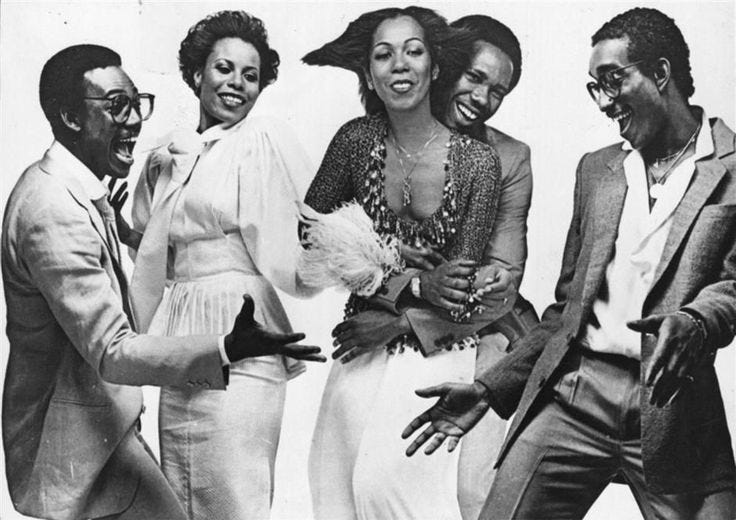[Nipped and tucked here and there, because heaven knows I’ve jettisoned some of my writer’s “tics” of almost 20 years ago. But the bulk of this remains, and remains true. Of all their comps, The Definitive Groove Collection is their best, the one I’d recommend to those unfamiliar with most of their catalog. And it’s still streaming! (See below.) I’ll have more to say about Chic and the Chic Organisation soon, but for now, this will make due.]
You should know the Nile Rodgers dossier already; as a producer he helmed the likes of Let’s Dance, Like a Virgin, Mick Jagger’s She’s the Boss, and Duran Duran’s Arena and Notorious—and those are just selected highlights. He’s also an astoundingly good guitarist. His partner in crime in the Chic Organization, super-bassist Bernard Edwards, was later a member of the Power Station and produced Robert Palmer’s Riptide and ABC’s “When Smokey Sings,” amongst others. Together they produced such R&B landmarks as Sister Sledge’s We Are Family and Diana Ross’s 1980 diana., as well as the entire output of their own band, Chic.
Chic were never—never—a disco group; pigeonholing them as such is just ignorant. They were an R&B band first and foremost, with plenty of funk and jazz thrown into the mix. And with not only Nile and ‘Nard but Tony Thompson on the drums and Alfa Anderson and Norma Jean Wright providing heaven-kissed vocals (the latter replaced after their debut album by Luci Martin), you’d think they couldn’t miss. You’d be right.
There was so much pure music, and musicianship, to Chic that it’s frankly rather astounding. Listen to “Savoir Faire,” a gorgeous instrumental track from their second album, C’est Chic: it’s a sumptuous string section, Tony doing the timekeeping, and Nile playing some of the most fluid, nimble licks this side of George Benson. Listen, then, to Chic’s “Everybody Dance,” and marvel at the bassline with which ‘Nard launches the song, Tony right beside him. The strings begin to swirl, Alfa and Norma Jean get their groove on, and what you’ve got is soul perfection. Sure, this doubles as disco, but it’s not of disco; it became it, but wasn’t born there.
Much of The Definitive Groove Collection’s first disc you likely know, as this is where the hits reside: “Dance, Dance, Dance,” “Le Freak,” “Good Times,” “I Want Your Love,” all still as fresh-sounding as ever—more so, in fact, thanks to Atlantic’s remastering job. Even better are the lesser-known singles and tracks here, such as “At Last I Am Free,” a ballad so beautiful it nearly brings tears to my eyes each and every time (later covered completely straight by would-you-believe-it English folkie Robert Wyatt); and “My Forbidden Lover,” a minor hit from Risqué which deserved better, as it’s the equal of “Good Times” though not anywhere close to as anthemic (which I guess answers my own question). “My Feet Keep Dancing,” released as a single at the close of 1979, points Chic’s way to the future, working its groove until it bores it into the ground. That’s a compliment; in its repetitive nature it brings to my mind no less than Steve Reich.
Disc two will be unfamiliar to all but devotees, but might actually better the one which precedes it. As their fame and fortune steadily decreased—and by the end of the ‘70s, it was nowhere but down for Chic, too disco-identified were they—they stretched out further and further artistically. Real People’s “Rebels Are We” (their final top 10 R&B single) is definitely the sound of a new decade, punk-funk all the way, especially in Nile’s guitar work and its attitude (from the title on, duh). “Your Love Is Cancelled” is so odd, lyrically, I’m not sure how to approach it—I mean, it compares a relationship to a TV show. 1982’s “Soup for One,” their last top 40 R&B single, was sampled by Modjo for their monster 2001 house smash “Lady (Hear Me Tonight)” and continues using the template Chic had seemingly settled on by that point: repetitive, locked-in grooves (which occasionally reach almost drone-like highs), mantra-like lyrics, Nile’s by-then famous chicken-scratch guitar, and an endless sense of propulsion.
They were still capable of stunning, too, as evidenced by Tongue In Chic’s lush ballad “When You Love Someone” (which also features some lovely keyboard work). Mariah Carey should’ve forced Jermaine Dupri to produce a cover of this for her; it would’ve forced her to stretch a bit vocally, and they could especially have had fun with the song’s late, abrupt (up)tempo change. (And just imagine that in the hands of her remixer of choice, David Morales! I gasp.) The same album’s “Hangin’” has a soupçon of George Clinton in it, while Believer’s “Give Me the Lovin’” draws a straight line between late-period Chic and the world Nile did on Let’s Dance and Like A Virgin. That late-’83 album Believer, their last before reforming in the ‘90s with new vocalists, also gives up its title track and “You Are Beautiful,” both of which show a profound catching-up-with-new-wave downtown NYC influence. They’re sharp, angular dance-funk and should be cherished for just that reason. Chic’s 1992 reunion, Chic-ism provides a pair of tracks in closing, pleasant-enough house-R&B but nothing much more.
Chic’s influence on pop, R&B, and dance music can still be heard over 20 years past their time. (“You Are Beautiful” → Nelly Furtado’s “Maneater,” for example. Connect the dots your damn self.) That’s indisputable. Hopefully, The Definitive Groove Collection will open new generations to their ridiculous brilliance. Every aspect of their music was top-of-the-line, from its engineering and production to vocals, instrumentation and of course, those songs, reminding the rest of us of just how powerful Chic were as a creative force. The missing link between P-Funk and Jam & Lewis, and as “You Are Beautiful” says, “Unlike Clark Gable, I give a damn.” You should too. A+



